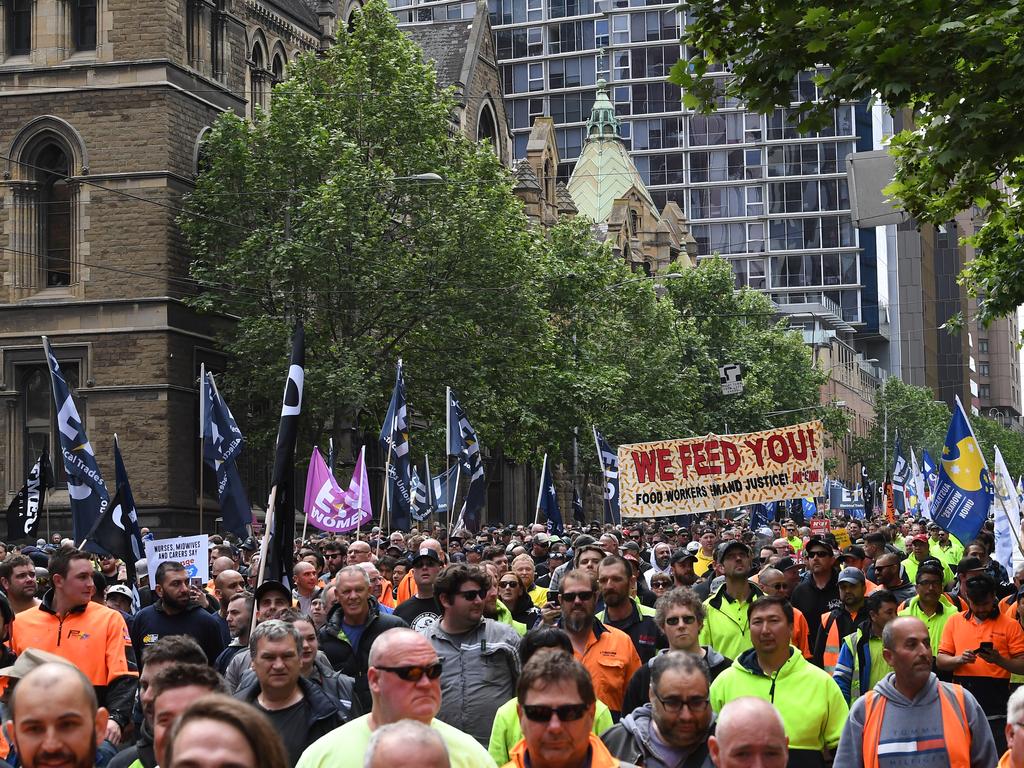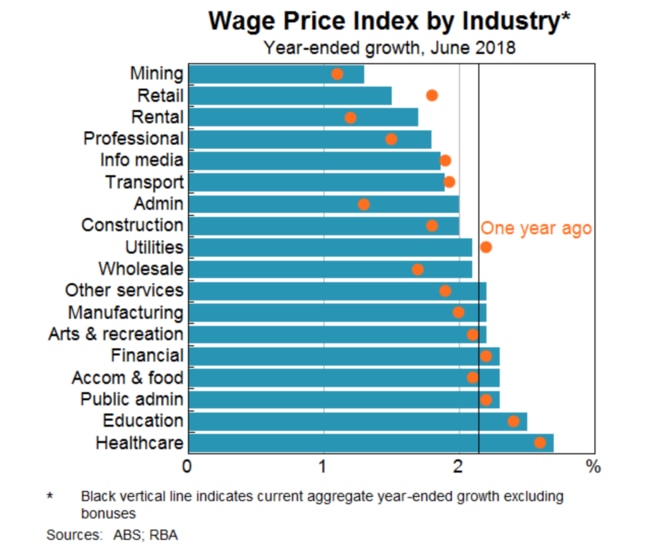Do CEOs deserve their huge wages?
THIS Aussie CEO is on $4.5 million. But workers are getting poorer every day. Is there any justification for the huge pay packets?

PROTESTS are erupting over CEO pay. One type of protest you can see on the streets. Australia boiled over with anger this week as unionists marched for equality.
“We need to bring back balance to the system so working people get fair pay rises,” said Australia’s chief unionist Sally McManus.
“It is not right that profits are up, CEO bonuses are up, but our pay is not.”
She has a point. Aussie CEOs got a 12.4 per cent pay rise in the 2017 financial year to $4.36m, (median realised pay for an ASX100 CEO) according to analysis from the Australian Council of Superannuation Investors.
That’s about six times faster growth than Aussie worker pay. Our pay is growing much more slowly. As this next graph shows it is stuck at 2 per cent growth a year, according to three different measurement techniques. Not long ago we could have expected 4 per cent.

Two per cent pay rises might sound OK, but don’t forget consumer price inflation is at 2.1 per cent. In real terms we are inching backwards.
When millions of people are running on a treadmill going nowhere, it’s a tough environment to be arguing that CEOs deserve more money.
What’s interesting is that anger about excessive CEO pay is not confined to people who wear high-vis and steel toe boots. Even investment managers who start each day by putting a Windsor knot in their Hermès ties are cross about it.
Those investment managers may not be marching but they have ways of making their displeasure felt. At annual general meetings, shareholders must vote on executive pay, and recently quite a few of those votes have been in the negative. That has been rather souring the mood.
DO WE COMPETE FOR CEOs?
At Telstra’s annual general meeting a huge majority of shareholders voted against the pay awarded to CEO Andy Penn. That made the Telstra chairman John Mullen furious. He quickly leapt to the defence of the CEO’s $4.5 million pay packet.
”First class leadership could not be more critical,” said Mullen. “A number of things contribute to our being able to attract, retain and motivate high calibre executives, one of which is remuneration.”
Is he right? Would Andy Penn not bother turning up if Telstra paid him $2 million instead? Or are they worried he might be poached by another telecommunications company?

High CEO pay is a choice. The average Japanese CEO is paid 10 per cent of the average American one. Our high CEO pay is partly driven by the fact that at the top of big companies, insiders sit on the remuneration committees that decide how much executives get paid.
Some of the insiders are former CEOs. Some are current CEOs and the rest probably aspire to be a CEO one day. It is no wonder they all support high pay.
(The remuneration committees outsource some decision-making to external consultants, but don’t forget — those consultants need executive pay to be high and complicated to justify their existence.)
WHY LOW WAGES RIGHT NOW IS SUCH A PROBLEM
The current pitiful growth in workers’ wages is especially bad news because of when it is happening. The Australian economy is growing. Unemployment is now, finally, at its lowest level in six years. It has fallen to 5 per cent in seasonally adjusted terms. That, folks, is what used to be called full employment.
MORE: Union rally brings Melbourne to a halt
MORE: Telstra’s dire problems affect us all
So why the heck is there no wages growth? It’s like your parents win the lottery and you still get a lump of coal for Christmas. When the economy is booming and we’re near full employment, wages should be rising.
(One reason is that a lot of people counted as employed want more hours — in many cases a lot more hours.)

The situation of falling unemployment and weak wages growth is not unique to Australia. In America, they have driven down the unemployment rate to an astonishing 3.7 per cent — the lowest in half a century, and still the economists are out with their magnifying glasses, trying to find clues for why wages growth for workers are so low.
I’M NOT A CEO, HOW DO I EARN MORE?
There are ways to get paid more. One is to join a booming industry like healthcare. As this next graph shows, you are definitely better off being a doctor or a nurse than a miner or a retail worker. The differences between industries are not huge in any one year, but if they maintain over time they could make a huge difference.

Jason Murphy is an economist. Follow him on Twitter: @jasemurphy




